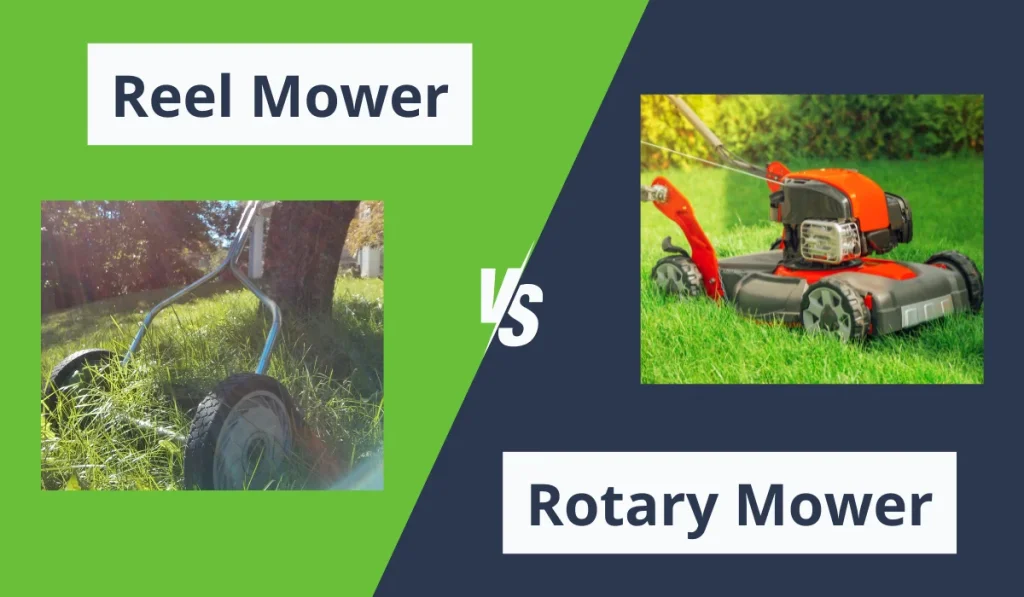Did you know mowing with a reel mower can produce a healthier lawn than a rotary mower? Reel mowers slice grass blades like scissors, leading to a cleaner cut and less damage.
As eco-conscious living gains popularity, choosing the right lawn care equipment becomes more significant. Keep reading to find out which mower suits your needs.
Key Takeaways
- A reel mower is quiet, eco-friendly, and cuts grass precisely but requires manual effort and regular maintenance.
- A rotary mower works well on rougher terrain, handles thicker grass, and offers adjustable height settings with different power options.
- Reel mowers are best for short, finely textured grass, while rotary mowers can handle both short and tall grass.
- Factors like lawn size, grass type, noise level, ease of use, and cost will help you decide between a reel and a rotary mower.
What Is a Reel Mower?
A reel mower, or cylinder mower, is a simple, eco-friendly lawn care tool that doesn’t need gas or electricity. It cuts grass cleanly with a scissor-like motion, making it quiet and efficient.
Using it provides a light workout, and its low-maintenance design is ideal for small, flat lawns.
What Is a Rotary Mower?
In contrast, a rotary mower is the go-to option for homeowners with larger lawns or tougher grass. A rotary mower operates with a high-speed, horizontally rotating blade that cuts grass upon impact, making it effective for a variety of grass types.
These mowers are available in different power options, including electric and gas, offering flexibility to suit various lawn sizes and user preferences.
With adjustable cutting heights, rotary mowers can accommodate different grass growth stages, and their versatility on rough, uneven ground makes them ideal for medium to large lawns.
Reel Mower vs. Rotary Mower: Key Differences

Deciding between a reel mower and a rotary mower depends on several factors. Here’s a breakdown highlighting their distinctions to help you decide.
Cutting Mechanism
When comparing these two types of mowers, their cutting mechanisms can affect the precision and quality of cut. Here’s how each mower operates:
| Reel Mower | Rotary Mower |
|---|---|
| Cylinder with revolving blades like a pair of scissors against a stationary bed knife | Horizontal rotary blades |
| Fine and clean, like scissors | Less precise, more tear |
Different Grass Types
Understanding their performance on different grass types and landscapes is important. Here’s how their suitability and the types of grass they handle best differ:
| Reel Mower | Rotary Mower |
|---|---|
| Best for short, finely textured grass types | Works on both short and long grass |
| Bermuda, Zoysia, and other warm-season grasses | Varied, including tall grass |
Mowing Height
Choosing the best option for your lawn care needs understanding their adjustability features. Consider how each type handles height adjustments and precision:
| Reel Mower | Rotary Mower |
|---|---|
| Limited adjustability; manual adjustments required | Easy-to-use lever or mechanism for quick adjustments |
| Requires careful tweaking for precise height | Offers flexible height settings for varied lawns |
Maintenance
When comparing reel and rotary mowers, it’s important to look at the maintenance demands of each type. Here’s how they differ in this aspect:
| Reel Mower | Rotary Mower |
|---|---|
| Requires regular sharpening, but often maintains sharp blades longer. | Needs more frequent sharpening, especially on tough grasses. |
| Involves backlapping to maintain cutting quality; requires DIY knowledge. | No backlapping needed; simpler sharpening process. |
| Less prone to clogging due to design. | May need attention to prevent clogging, particularly with heavy use. |
What to Consider When Choosing a Lawn Mower
When selecting a mower for your turfgrass, consider how certain factors will shape your lawn care routine. These factors will influence your ability to maintain a lush, green lawn that meets your needs.
Lawn Size
The size of your lawn can influence the kind of mower you choose. For smaller yards, you might choose maneuverability and ease of storage. For larger spaces, efficiency and speed become more significant.
Grass Type
Different grass types may call for different mowing techniques. Low-growing grasses like those in golf courses might need a more precise cut. Meanwhile, thicker, taller varieties could enjoy a mower that handles tougher textures.
Noise Level
If you’re sensitive to noise or live in a quiet neighborhood, the sound level of your mower will be a key consideration. Some electric mowers operate quietly, while others generate more noise. Depending on when and where you plan to mow, this could impact your choice.
Ease of Use
Think about how much physical effort you will put into lawn care. Some mowers are lightweight but need more manual strength. On the other hand, others offer features that reduce strain and improve convenience.
Cost
Your budget can guide your decision. Consider the initial purchase price along with potential long-term maintenance costs. Some mowers are more affordable upfront, while others may offer features like trimmers that justify a higher price tag.
Frequently Asked Questions
Can reel lawn mowers handle tall grass as well as rotary mowers?
Reel lawn mowers struggle with tall grass due to their scissor-like cutting mechanism. They work best on short, regularly maintained lawns. Rotary mowers, equipped with faster spinning blades, can tackle taller grass more easily. Users might find rotary mowers more versatile in handling varied grass heights.
How do the cutting results differ between reel and rotary mowers?
Reel mowers snip grass cleanly, like scissors, leaving lawns looking neatly manicured. Rotary mowers, when maintained with sharp blades, also offer clean cuts, but dull blades may lead to a rougher, tearing motion. Their choice often depends on the desired lawn appearance and maintenance habits.



